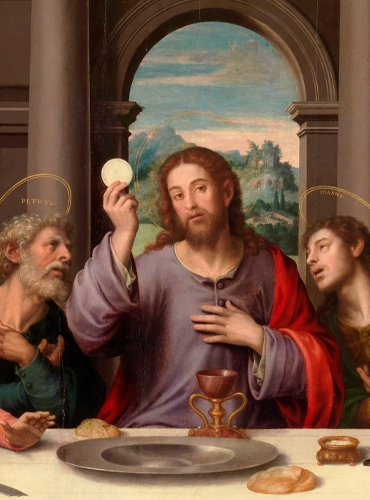Thursday of the Third Week of Easter – Option 2 – Jn 6:44-51
In today’s Gospel, we’re presented with another selection from the Bread of Life discourse that we’ve been hearing throughout the week. There’s a lot that can be said, but we can focus on just one part: what it means to be taught by God and to learn from Him.
In this part of the discourse, Christ tells His listeners that: “It is written in the prophets: They shall all be taught by God. Everyone who listens to my Father and learns from him comes to me.”
There are two things that really stand out. First, notice that Christ says the prophets, meaning, all of them, and not a specific one. It’s an odd way to cite Scripture, and there’s a reason for it: the text Jesus cites doesn’t appear exactly in any of them, but, as Saint Bede points out, all the prophets agree with it. God wants to teach His people; He wants them to learn about Him and His goodness. The difference, as Saint John Chrysostom notes, is that before, in the time prior Christ, God did it through men, His prophets, but now He does it through His only-begotten Son.
Second, Saint Augustine tells us what it means that God “teaches everyone to come to Christ”: he writes, “When a schoolmaster is the only one in a town, we say loosely, ‘This man teaches all here to read’; not that all learn of him, but that he teaches all who do learn. And in the same way we say that God teaches all men to come to Christ: not that all do come, but that no one comes in any other way.” This idea that not everyone comes to Christ is also expressed by the word Jesus uses for draw, as when He says, “No one can come to me unless the Father who sent me draw him.” That word for draw usually implies some resistance on the part of the thing being drawn. God works to break through our stone hearts, and to reach out to us in our needs and sinfulness.
So, what does this Gospel then mean for our lives? We know that God is a loving father, and He wants us to love and serve Him in return. It’s been said, though, that ‘the greatest misfortune of humanity today is the lost sense of childlikeness, because it renders God’s fatherly activity, His fatherly-educational work, impossible.’ In other words, God can’t teach us, He can’t form us, and He can’t love us as He desires if we aren’t willing to become children before Him. Many of Christ’s listeners, even among His disciples, would refuse to believe, and thus would not allow God to teach them the way back to the Father. This is a danger for us too, if we refuse to be humble and become like children, aware of our own limitations and the need we have to rely completely on God.
We can ask ourselves: do we really try to learn from God the lessons of His love and providence? Are we humble enough to learn from Christ, or do we refuse to become like children before Him?
Today, let us pray, through the intercession of Mary, Mother of our Risen Lord, for the grace to surrender ourselves entirely to God, to learn from His Son, and to follow His path to eternal life.






